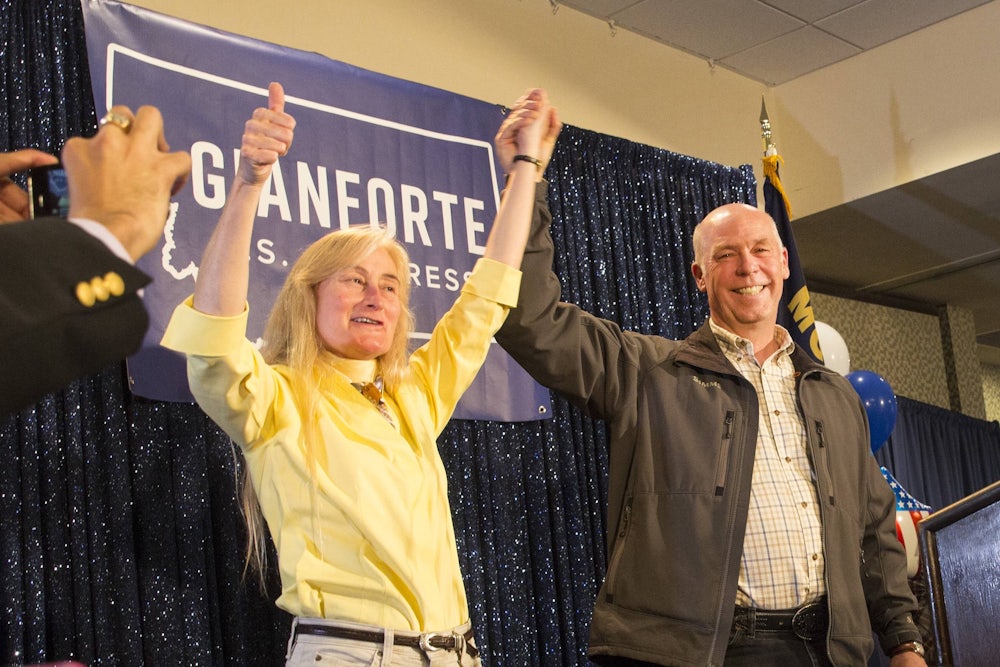Republican Greg Gianforte defeated Democrat Rob Quist in a special election Thursday for Montana’s lone congressional seat, a six-point victory that should horrify you because he won with the full support of the GOP after body-slamming and punching an American reporter—and many of our political institutions, especially the media, are too paralyzed to impose a meaningful consequence on him or his enablers.
Gianforte, a true coward, didn’t admit any wrongdoing until his victory speech, at which point the risks of playacting decency pertained to his criminal case—the police have charged him with assault—rather than the election. “When you make a mistake, you have to own up to it,” Gianforte said. “That’s the Montana way.” I suspect some Montanans would object to the notion that you only apologize once it’s politically safe to do so.
For it was already beyond dispute on Wednesday night, thanks to audio of the attack and a witness account from a Fox News reporter, that Gianforte had attacked the Guardian’s Ben Jacobs. That’s when the process of public accountability began. In a healthier political culture, the condemnation would have been nearly unanimous, and the context of the incident would not have been a matter of controversy. What we witnessed instead was a political media—confronted with a one-sided assault on its most basic freedom—rendered by its own constructs largely incapable of identifying the threat with any precision.
Our politics is beyond broken. A) this shouldn't be seen as a successful strategy. B) paid professionals should be ashamed exploiting it https://t.co/Jprp5wzD31
— Chuck Todd (@chucktodd) May 25, 2017
Before he became president of the United States, Donald Trump toured the country encouraging violence against protesters and whipping up animosity toward the press. Earlier this month, Trump’s Health and Human Services secretary, Tom Price, sicced police on a reporter who was trying to ask him a question in the West Virginia state capitol on account of the fact that he didn’t recognize the reporter as an attendee of a press conference, then praised the police for their diligence. Last week, the FCC’s security detail manhandled a tech reporter at the National Press Club.
Republicans know in theory how to get their hackles up over political violence directed at reporters, because in January 2010, when an aide to Massachusetts Attorney General Martha Coakley pushed a conservative reporter (then helped him up, and apologized for his behavior) Republicans tried to end his career in public service.
Their tacit acceptance of a culture of antagonism and violence directed at the press suggests at least that the party’s values have changed.
Set aside for a moment the fact that it is within the power of all Republican elites to disavow candidates who abandon basic civic duties, or to endorse their opponents. At his weekly Capitol briefing, House Speaker Paul Ryan demurred that “if [Gianforte] wins, he’s been chosen by the people of Montana,” a tautological evasion of the fact that he intends to welcome Gianforte into the House GOP conference and support him in future elections.
The press is perfectly well equipped, and equally within the bounds of good practice, to close ranks around Jacobs, hound Gianforte, demand contrition, mark him for extraordinary scrutiny. It is much less well equipped to address the threat at its root.
Republican-condoned violence against media has thrust the media’s capacity for self-preservation into conflict with its cult of performed even-handedness and performed even-handedness is winning.
All the more because of Gianforte’s victory, conservative candidates across the country know they can abuse reporters, lie about it, use political violence to raise money, and find safe harbor in the Republican cloakrooms of the United States Capitol. Yet taking all of this in, the NBC News political cheat sheet First Read lamented that the “body slam of [a] reporter is another sign of America’s broken politics.” That conclusion isn’t wrong, much as the damaged wing of an airplane might send the whole vessel into a spiral dive, and, in surveying the wreckage, one could accurately exclaim that “the plane broke.”
I don’t know if Republicans broke American politics or if Republican politics is broken and endangering the whole political system, but it can’t be fixed so long as political elites can’t acknowledge or understand what the source of the failure is. Responding to a moldy sack of protoplasm who writes for the Daily Caller, CNN editor Chris Cillizza leapt to Jacobs’s defense.
I don't get this. If you are a reporter, you should defend the rights of reporters to ask questions without fear of physical violence. https://t.co/3qqL37UdhL
— Chris Cillizza (@CillizzaCNN) May 25, 2017
This is attitudinally correct, but his incredulousness belies a misunderstanding of movement conservatism and the media outlets that the movement has spawned. With exceptions, they do not conceive of themselves as playing on the same turf, let alone by the same rules, as establishment news organizations and liberal media outlets. The fact that Republicans are defending Gianforte and conservative journalists piled on Jacobs isn’t confusing or an outgrowth of “broken politics,” but the inevitable consequence of virulent illiberalism in the American right.
On Thursday morning, the anti-Trump Republican strategist Rick Wilson wrote a bracing denunciation of those on the right who defended the assault of a reporter—though one seemingly premised on the belief that the “cultural collapse of the GOP into the Trump Troll Party” might be reversed through reason. In truth, everything that’s happened in the past year or so has conditioned conservatives to believe they will face no consequences for poor or unprincipled behavior. They write off the accurate assessments of anti-Trump Republicans like Steve Schmidt or Democrats like Senator Brian Schatz as the impotent complaints of political losers, knowing the public will learn about the assault of a reporter as an essentially partisan spat that centrist pundits, out of fear of bad-faith accusations of bias, will blame on broken politics instead of defending their own interests effectively.
This article has been updated.
